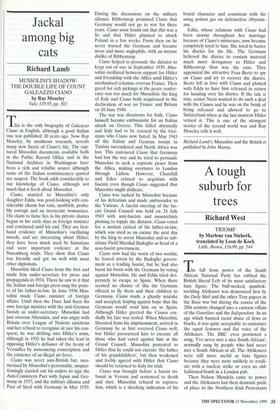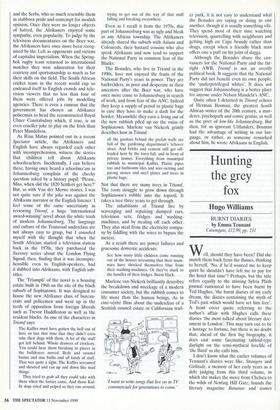A tough suburb for trees
Richard West
TRIOMF by Marlene van Niekerk, translated by Leon de Kock Little, Brown, £16.99, pp. 544 The fall from power of the South African National Party has robbed the British liberal Left of its most satisfactory hate figure. The bull-necked, sjambok- wielding Afrikaner was demonised first by the Daily Mail and the other Tory papers in the Boer war but during the course of the 20th century changed into a cartoon villain of the Guardian and the Independent. In an age which banned racial abuse of Jews or blacks, it was quite acceptable to caricature the squat features and flat voice of the Afrikaner. The BBC even promoted a song, 'I've never met a nice South African', normally sung by people who had never met a South African at all. The Afrikaners were still more useful as hate figures because they were most unlikely to retali- ate with a nuclear strike or even an old- fashioned bomb in a London pub.
Then Nelson Mandela came to power and the Afrikaners lost their demonic pride of place to the Northern Irish Protestants and the Serbs, who so much resemble them in stubborn pride and contempt for modish opinion. Once they were no longer objects of hatred, the Afrikaners enjoyed some sympathy, even popularity. To judge by the television documentaries on the Boer war, the Afrikaners have once more been recog- nised by the Left as opponents and victims of capitalist imperialism. When the Spring- bok rugby team returned to international matches they won admiration for their courtesy and sportsmanship as much as for their skills on the field. The South African cricket team in the recent world cup so endeared itself to English crowds and tele- vision viewers that no less than four of them were offered jobs by modelling agencies. There is even a rumour that the government has chosen an Afrikaner policeman to head the reconstructed Royal Ulster Constabulary which, if true, is an even crueller joke to play on the Irish than Peter Mandelson.
As Rian Malan pointed out in a recent Spectator article, the Afrikaners and English have always regarded each other with incomprehension, witness the stories that children tell about Afrikaans schoolteachers. Incidentally, I can believe these, having once heard a schoolma'am in Johannesburg complain of the cheeky question asked by a history pupil: 'Please, Miss, when did the 1820 Settlers get here?' But, as with Van der Merwe stories, I was not quite sure if the joke was against the Afrikaans narrator or the English listener. I feel some of the same uncertainty in reviewing Triomf, a huge 'international award-winning' novel about the white trash of modern Johannesburg. The language and culture of the Transvaal underclass are not always easy to grasp, but I consoled myself with the thought that when the South Africans started a television station back in the 1970s, they purchased the Sweeney series about the London Flying Squad, then, finding that it was incompre- hensible even to English-speakers, had it dubbed into Afrikaans, with English sub- ' titles.
The 'Triumph' of the novel is a housing estate built in 1960 on the site of the black suburb of Sophiatown. It was designed to house the new Afrikaner class of bureau- crats and policemen and went up in the teeth of opposition from foreign liberals such as Trevor Huddleston as well as the resident blacks. As one of the characters in Triomf says:
The Kaffirs must have gotten the hell out of here so fast that time that they didn't even take their dogs with them. A lot of the stuff got left behind. Whole drawers of crockery. You could hear them breaking to pieces as the bulldozers moved. Beds and enamel basins and zinc baths and all kinds of stuff. That was quite a sight. The Kaffirs screamed and shouted and ran up and down like mad things.
They tried to grab all they could take with them when the lorries came. And those Kaf- fir dogs cried and yelped as they ran around, trying to get out of the way of that stuff falling and breaking everywhere.
Even as I recall it from the 1970s, this part of Johannesburg was as ugly and bleak as any African township. The Afrikaners already shared the suburb with Asians and Coloureds, their bastard cousins who also speak Afrikaans and now tend to support the National Party in common fear of the Blacks.
The Benades, who live in Triomf in the 1990s, have not enjoyed the fruits of the National Party's years in power. They are backvelders, as poor and desperate as their ancestors after the Boer war, who have once more come to Johannesburg in search of work, and from fear of the ANC. Indeed they keep a supply of petrol in plastic bags in case they have to make a dash for the border. Meanwhile they earn a living out of the new rubbish piled up on the ruins of Sophiatown. Marlene van Niekerk grimly describes how in Triomf
all the gardens behind the prefab walls are full of the gardening department's leftover aloes. And bricks and cement still get off- loaded here by the lorry-full, and in front of private homes. Everything from municipal rubbish to municipal Kaffirs. Plastic pipes too and bathroom tiles and wire-netting and paving stones and steel plates and trees in plastic bags.
Not that there are many trees in Triomf. The roots struggle to grow down through Sophiatown's rubble into the topsoil. It takes a tree three years to get through.
The inhabitants of Triomf live by scavenging and repairing dumped cars, television sets, fridges and washing- machines, and by stealing off each other. They also steal from the electricity compa- ny by fiddling with the wires to bypass the meters.
As a result there are power failures and gruesome domestic accidents:
See how many little children come running out of the houses screaming that their mum- mies have shocked themselves blue from their washing-machines. Or they've stuck to the handles of their fridges. Burnt black.
Marlene van Niekerk brilliantly describes the breakdown and wreckage of a modern consumer society, but the rubbish comes to life more than the human beings. As in cind-verit6 films about the underclass of a Scottish council estate or Californian trail- '1 want to write songs that live on in TV commercials for generations to come.' er park, it is not easy to understand what the Benades are saying or doing to one another, though it is usually something vile. They spend most of their time watching television, quarrelling with neighbours and getting high on Cape brandy rather than drugs, except when a friendly black man offers one a puff on his joint of dagga.
Although the Benades abuse the can- vassers for the National Party and the far- right AWB, Triomf is not an overtly political book. It suggests that the National Party did not benefit even its own people, the 'underprivileged whites'. It does not suggest that Johannesburg is a better place for anyone under Nelson Mandela's ANC.
Quite often I detected in Triomf echoes of Herman Bosman, the greatest South African writer of the 20th century, a mur- derer, psychopath and comic genius, as well as the poet of low-life Johannesburg. But then, for us ignorant Uitlanders, Bosman had the advantage of writing in our lan- guage, or rather, as someone remarked about him, he wrote Afrikaans in English.



























































































 Previous page
Previous page